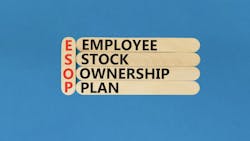Why Are So Many Firms Going Employee-Owned?
The number of employee-owned companies in the U.S. is growing slowly but surely, reversing the decline in the number of employee-owned firms of the 2010s, data from the National Center for Employee Ownership show. And construction companies look to be some of the best candidates for future employee stock ownership plan (ESOP) transactions, partly because ESOPs are great succession vehicles for family-owned companies when there's no next-generation leadership ready to take the reins.
Nearly one-third of the largest 100 ESOP-owned firms in the U.S. are construction companies or are in construction-adjacent fields such as architecture and engineering. Large ESOP-owned companies include Black & Veatch, Terracon, Swinerton Builders, and many more.
Why Are ESOPs Popular With Construction Companies?
The number of construction industry firms adopting or considering the ESOP business model is growing due to a combination of demographic and economic factors that make ESOPs particularly appealing for privately held construction companies.
RELATED
- Make Your Exit: Succession Planning for Smooth Leadership Transfer
- Management Succession Strategies for Home Builders
- After Recruiting and Hiring, Put in the Work to Keep Employees
ESOPs are nothing new—they were first allowed by the IRS in 1956. The pandemic is the key to their growing popularity in the construction industry.
The COVID era caused chaos for construction firms, as supply chains were disrupted, capital was frozen, and projects suffered delay after delay. It was an enormously challenging time for the home building and construction industries, and conditions arguably still haven't reached a "new normal."
A combination of demographic and economic factors make ESOPs particularly appealing for privately held construction companies.
That difficult interlude caused moments of realization for many construction company owners, some of whom had previously planned to pass their business on to their children. Grappling with pandemic-generated issues, these business owners began second-guessing that idea. Did they want their family to deal with existential "What's next?" questions? Coupled with next-generation members often not wanting to be in the construction business, the need to find an alternative ownership structure became apparent.
What Is an ESOP and What Are the Advantages?
ESOPs represent the opportunity for a rare win-win-win for many firms, benefiting owners, employees, and the business itself nearly equally.
Here's how they work:
- The company itself establishes an ESOP trust.
- That trust borrows money from a bank or seller note to buy company shares and purchases them at fair market value.
- The ESOP trust then allocates the shares to employees over time.
The benefits are that the company owner can remain involved in the business and receive certain tax benefits. Employees gain more and more ownership in the company over time, allowing the company to retain its culture and creating more job security for employees.
That means owners can engineer a succession plan that leaves the business to those who know the industry and the culture, preserving valuable institutional memory. For owners who haven't yet reached retirement age or are just looking to take some risk off the table, ESOPs provide a practical first step, allowing them to sell a tranche (30% or more) of the company to the ESOP trust.
Also, tax-conscious owners can employ a tax deferment strategy and reinvest their proceeds in qualified replacement property.
The employee-first mindset signals something important about a company's culture and provides team members with greater autonomy and control over their destinies.
ESOPs benefit employees by providing a retirement plan with moderate risk and no cost. Unlike a 401(k), where employees put away their funds, an ESOP costs employees nothing. Upon retiring, employees sell their shares back to the company, realizing gains based on the success of the business.
An ESOP can likely benefit the business most in the area of employee retention and motivation. By giving employees a stake in the company, team members have a more significant stake in the business' performance and direction.
A better-performing business benefits the people making it happen, which can translate to a powerful incentive in a people-driven industry like construction. Team members have even more reason to find efficiencies and to keep projects on schedule and budget, when doing so positively affects their bottom lines.
ESOP businesses also have a tax benefit. A 100% employee-owned S-corporation has zero tax liability: It does not owe any federal income tax or, in many cases, no state tax. In an industry where "cash is king," construction companies have been able to use those freed-up tax dollars to reinvest in the company, including safety, technology, and training for their people.
The Role of ESOPs in Hiring and Retention
The construction industry has been grappling with a significant talent shortage for years, and operating as an ESOP creates a competitive advantage in attracting young talent looking for career opportunities. Job seekers desire the ability to accumulate equity and contribute to building something larger than themselves when starting a career. The employee-first mindset signals something important about a company's culture and provides team members with greater autonomy and control over their destinies. Employee interests are even represented with a seat on the board.
In comparison, a private equity-funded exit—less common in the risk-laden construction industry but still possible for firms with recurring revenue streams from mechanical, electrical, and plumbing services and maintenance contracts—can create less attractive dynamics than an ESOP buyout. Earnings pressure to pay down debt can be intense with PE's short ownership horizons, and short leashes on management can force ill-advised cost-cutting that can hurt the overall business.
In an industry so heavily reliant on its employees' labor, more and more owners are coming to understand the benefits of an ESOP. Even if they're not ready to retire, ESOPs allow owners to reward their employees while still participating in their businesses.
Construction firms are builders and entrepreneurs by nature, and they can now create a new ownership model that may cause other industries to take notice. The construction industry's ESOP push may only be the beginning. The future may be employee-owned.

